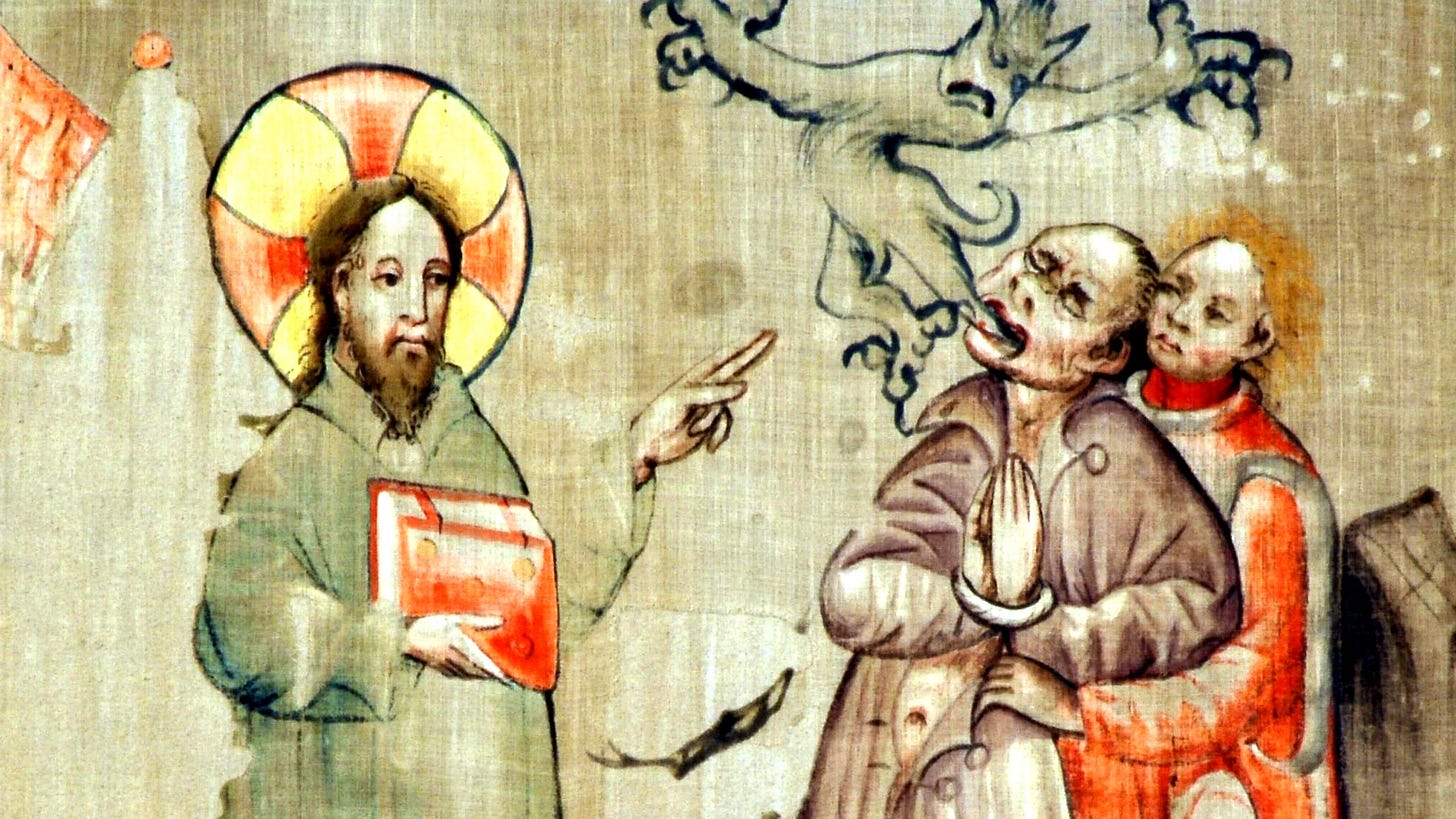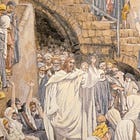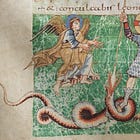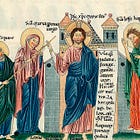The moment Christ announces his invasion of Satan’s kingdom
Our Lord made clear that he had not come simply for a few exorcisms—but for the total overthrow of Satan by 'the stronger man.'

Our Lord made clear that he had not come simply for a few exorcisms—but for the total overthrow of Satan by 'the stronger man.'
Editor’s Notes
In this piece, Fr. Coleridge tells us…
How Christ declared the overthrow of Satan’s kingdom.
That His words revealed the collapse of the old order and the dawn of the new.
Why His enemies, hardened by sin, could not grasp their own defeat.
He shows us that the Gospel is not simply an announcement but an invasion—the Kingdom of God overthrowing the dominion of darkness.
For more context on this episode, its significance and its place in the Roman Liturgy, see here.
Our Lord and his Slanderers
The Preaching of the Cross, Part II
Chapter II
St. Luke xi. 14-36
Story of the Gospels, § 103
Burns and Oates, London, 1887
Headings and some line breaks added.
Sung on the Third Sunday of Lent
Part I: How did Christ turn back the charge of casting out devils by Beelzebub?
Part II: The moment Christ announces his invasion of Satan’s kingdom
Part III: Did Christ rebuke the woman who praised his Mother?
Part IV: Why does Christ refuse to prove himself on demand?
Part V: Why does rejecting the truth lead to deeper darkness?
Satan’s kingdom invaded
‘When a strong man armed keepeth his court, those things are in peace which he possesseth. But if a stronger than he come upon him and overcome him, he will take away all his armour wherein he trusted, and will distribute his spoils.’
Satan had indeed usurped the kingdom of the world. He had not only reduced men under the bondage of sin, and so deprived them of their rights and hopes as the children of God. He had debased society in a thousand ways by the moral corruption which he had introduced, and the intellectual darkness and social miseries and cruelties which had resulted therefrom. More than this, he had set up falsehoods in the place of truth as the principles and guides of life, and he had enthroned himself and his followers even as the objects of worship, a worship full of turpitude and nameless abominations.
All this kingdom was now being shaken to its centre, and it was to crumble to pieces and vanish away before the light and grace of the Gospel Kingdom. The power of delusion, the false fears, the superstitious beliefs, and all the impostures by which the world was kept in chains, were to be taken away, and in the place of the kingdom which had been set up and which filled the whole world with the results and manifestations of its reign, was to rise the Empire of our Lord. The homage and worship of mankind were to be directed to the true God, society was to be regenerated and elevated, and the mighty system of the Church was to be spread over the whole earth as the home of the affections and the hopes of mankind.
‘He that is not with Me’
‘He that is not with Me is against Me, and he that gathereth not with Me scattereth.’
If these words, in their application to the human enemies of our Lord’s Kingdom, were full of truth when they were first spoken, in answer to this calumny of the Pharisees so many months before, they were still more significant now. Then the Pharisees had, indeed, first turned away from our Lord, then opposed Him, then persecuted Him, and sought His life. At that very time, they were in league in Galilee with the ministers of Herod to bring about His death. But since that time, the breach had widened, their hearts had become harder, their enmity even more wild, their measures more violent, their intentions more unscrupulous. Since that time, there had been a year and a half of our Lord’s ministry, and this period had been crowned by that presence of His at the feast of Tabernacles, which might have brought them round, but which, instead, had intensified their malice.
Our Lord could see, what was hidden to the human eye, the growth of their spiritual declension, the increase over them of the power of the evil one, of whom He had lately spoken to them as their father, and, in the state of the people whom they ought to have aided Him in bringing to conversion by their example and exertions, He had mournful proof of the efficacy of their work in the service of their true father. They had indeed been against the Redeemer of the world, they had scattered instead of gathering with Him.
Return of the evil spirit
‘When the unclean spirit is gone out of a man, he walketh through places without water, seeking rest, and not finding, he saith, I will return into my house whence I came out. And when he is come, he findeth it swept and garnished. Then he goeth and taketh with him seven other spirits more wicked than himself, and entering in, they dwell there. And the last state of that man becomes worse than the first.’
On the occasion of which St. Matthew has furnished the report, our Lord had gone on from the words about those who were not with Him and so were against Him, to utter the most solemn denunciation against the authors of the calumny about Beelzebub. He had spoken of the sin which was not to be forgiven, that is, not to go unpunished, either in this world or in the world to come—the blasphemy of the Spirit of which these men had made themselves guilty. And He had added more about making the tree good, and the fruit good, or the tree evil, and its fruit evil.
He had spoken of them as a generation of vipers, who could not speak good things, because they were evil at heart. He had solemnly warned them that, for every idle word, men should give an account at the Day of Judgment. All these strong words are not here reported by St. Luke, and there is every reason for thinking that on this occasion they were not spoken.
Our Lord’s gentleness here
Those who uttered the words about Beelzebub on this occasion were not guilty of inventing the blasphemy. They repeated what they had heard from men to whom they were bound to look up as their spiritual guides, much as the ordinary Protestant of the present day repeats what he has met with in current books of controversy, the substance of which is a mere repetition of falsehoods first circulated, perhaps, in the sixteenth or seventeenth centuries, and over and over again repeated, but which are still adopted without shame by the men with a varnish of learning who have the ignoble task committed to them of maligning the Catholic Church. We here meet in our Lord’s life with this phenomenon of the vitality of a lie which is common in our own experience.
Our Lord did not deal with the second-hand repeaters of the calumny as He did with its inventors, and the comparative gentleness of His language in this place shows us that on the two occasions the heinousness of the sin was different—greater in the first invention, less in the later circulation of the falsehood. We may suppose that it was on this account that He now omitted the terrible denunciations which occur at the earlier time, when He had received a similar but more heinous provocation at the hands of the Scribes and Pharisees. We may find the same reason for His omission to add, at the end of the passage now before us about the returning devil, the words by which on the former occasion He had applied the image specifically and prophetically to that ‘wicked generation.’
He might, indeed, have done this with perfect truth. But He was now dealing with persons comparatively excusable, and He may have refrained purposely from the additional severity which is expressed in the positive prediction in St. Matthew, that so it was to be with that generation.
Description of the evil spirit
The description itself hardly needs any detailed explanation here, when it occurs for the second time in the Gospel history. The only miserable rest which the evil spirits can find is in the exercise of their power for the tormenting and destruction of the creatures of God. The waterless deserts are the places in which men cannot live, and to which, in consequence, the devils find it a special torment to be banished, because they do not find there anyone on whom to vent their malice. The devil who has once been driven out naturally longs for the possessions of which he has been deprived, where he has made himself at home, and in which he has been accustomed to reign as a master.
It is not to our Lord’s purpose to give the whole history of the recovery of this possession by the devil, and thus He does not directly describe the process by which the man out of whom he has been cast becomes again liable, in the just Providence of God, to this terrible infliction. But when He speaks of the house as swept and garnished, He implies that there has been negligence and carelessness in occupying the soul with good thoughts, with the grace of God, in holy works, prayer, and the like. When the evil one is described as saying that he will return to his house, the language expresses the arrogance and lying presumption of the devils, who speak of things and persons as their own, and of themselves as masters of their own actions, whereas they are only able to do exactly what they are allowed by God, and unless He sees fit to punish or try the soul by further permissions to them, they cannot return to it, as they could not have first possessed it without His leave.
So again, when it is said that the evil spirit takes with him seven other spirits more wicked than himself, who enter in and dwell with him, this can only be because God sees fit to allow it, in punishment of the negligence and ingratitude of the man who has received so signal a favour in his original deliverance.
History of the Jews after the Passion
That this is constantly the case with individuals may be certain enough. As our gratitude brings down on us an ever-increasing shower of blessings, so does ingratitude provoke God to leave us more and more to ourselves. Thus our Lord can speak of the misery which He describes as if it were almost normal, especially as He dwells rather on the malignity of the devils than on human ingratitude.
We cannot doubt that He had before His mind what was actually to happen in the case of the Jewish priests and people. The history of the Jews in the interval between the Crucifixion and the destruction of Jerusalem should be more familiarly studied than is usual with us, if only for the sake of our understanding better the early history of the Church, and especially for the purpose of illustrating the great prophecies of our Lord in this regard. Nowhere in history can there be found a more terrible account of a nation abandoned to the destructive malice of evil spirits than in the picture of the last years of the Jewish polity and city, as drawn by one of themselves.
On the present occasion, as has been said, our Lord did not distinctly connect the fearful doom of which He spoke with the generation to which the people whom He was addressing belonged. He was speaking to the simple people in some town or village in Judaea, and not to the men who were chiefly responsible for the line taken against Him by the nation as such. We shall find Him presently speaking to some of these rulers and lawyers, and then He will apply more pointedly the prophecy which He has to utter.
End of Part II. Having warned of the danger of losing grace, our Lord now receives an unexpected tribute from the crowd. A woman’s exclamation praises his Mother—praise which he does not reject, but which provides him with an opportunity to teach where true blessedness (including that of Our Lady) lies.
Our Lord and his Slanderers
Part I: How did Christ turn back the charge of casting out devils by Beelzebub?
Part II: The moment Christ announces his invasion of Satan’s kingdom
Part III: Did Christ rebuke the woman who praised his Mother?
Part IV: Why does Christ refuse to prove himself on demand?
Part V: Why does rejecting the truth lead to deeper darkness?
Read Next:
Here’s why you should subscribe to The Father Coleridge Reader and share with others:
Fr Coleridge provides solid explanations of the entirety of the Gospel
His work is full of doctrine and piety, and is highly credible
He gives a clear trajectory of the life of Christ, its drama and all its stages—increasing our appreciation and admiration for the God-Man.
If more Catholics knew about works like Coleridge’s, then other works based on sentimentality and dubious private revelations would be much less attractive.
But sourcing and curating the texts, cleaning up scans, and editing them for online reading is a labour of love, and takes a lot of time.
Will you lend us a hand and hit subscribe?
Follow our projects on Twitter, YouTube and Telegram:






